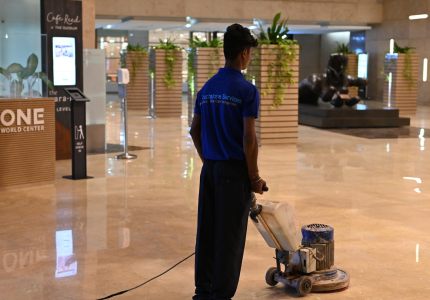Undoubtedly, marble floors and countertops lend an air of timeless elegance to any space. However, they also have a major drawback – they lose their lustre, develop scratches and accumulate stubborn stains. Fortunately, a professional marble polishing contractor can restore your surfaces to their original glory. Even though Mumbai is bustling with marble polishing contractors offering services at a highly competitive price range, there is a need to be very discerning before entrusting your precious marble surfaces to them.
To ensure you get quality workmanship, transparent pricing, and reliable customer service, here are the key questions to ask before hiring a marble polishing contractor:
What Is Your Experience with Marble Polishing in a Wet & Humid Environment?
Why it matters: Mumbai’s humid climate and monsoon-driven moisture can affect marble differently than in drier regions. A contractor familiar with the local weather patterns, water hardness, and pollution levels will know which polishing techniques, sealants, and finishing products work best to protect your marble long-term.
Can You Provide References or Before-and-After Photos of Recent Projects?
Why it matters: A reputable contractor should have no trouble sharing visual proof of their work. Before-and-after photographs demonstrate their skill in removing etches, scratches, and discolouration. Contacting previous clients can also give you insight into punctuality, professionalism, and the contractor’s ability to satisfactorily complete the job.
What Specific Polishing Process Do You Use?
Why it matters: Marble surfaces require a multi-step polishing process—typically grinding, honing, polishing, and sealing. Ask for details on:
- Diamond Pad Grit Progression: How many grit levels are used, and up to what grit? (Finer grits yield a higher gloss.)
- Sealing Products: Are the sealants water-based or solvent-based? How often will resealing be required?
- Equipment: Are high-quality machines being used and the method of dust-containment system is being employed to minimize dust and airborne particles?
Understanding their process will help you measure the contractor’s professionalism and whether they follow industry best practices.
What Is the Estimated Timeline for My Project?
Why it matters: Marble polishing is not a one-day affair. Depending on the size of the area, the current condition of the marble, and drying times for sealants, the project could span several days to weeks. Ask for a detailed schedule outlining when the job will commence, milestones for each polishing stage, and when the floor will be safe to walk on again.
Do You Offer a Warranty or Satisfaction Guarantee?
Why it matters: A contractor confident in their workmanship often stands behind it with a warranty or guarantee. Whether it covers surface defects, sealing failures, or gloss retention for a certain period, a warranty provides peace of mind and assurances that they will address any issues without additional cost.
What Safety and Cleanliness Measures Will You Take?
Why it matters: Marble polishing can generate fine dust that, if not contained, will settle on furniture, walls, and other surfaces. Ask about:
- Dust Control: Use of vacuum attachments and water-based polishing to reduce airborne particles.
- Protective Coverings: Floor mats, plastic sheets, or tape to shield skirting boards and nearby furniture.
- Site Cleanup: Timeline for debris removal and restoration of the workspace to its pre-job condition.
A clean, safe worksite minimizes disruptions to your household or business.
How Do You Determine Pricing? Is It a Flat Rate or Per-Square-Foot?
Why it matters: Transparency in pricing helps you compare multiple quotes objectively. Some contractors charge a flat rate, while others bill per square foot or per polishing stage. In Mumbai, material costs and labour rates can fluctuate; clarify what is included in the quote (e.g., transportation, sealing, protective coatings) and what might incur extra charges.
Do You Have Experience with Special Finishes or Restoration Projects?
Why it matters: Beyond standard polishing, you might want specialty finishes—such as a high-gloss “wet look,” anti-skid treatment for bathroom tiles, or restoration of antique marble in heritage homes. Ensure the contractor has relevant experience and can show examples of similar projects.
Can You Provide a Written Contract?
Why it matters: A detailed contract should outline scope of work, timelines, payment schedule, warranty terms, and liability clauses. This legal document protects both you and the contractor, reducing the risk of misunderstandings or disputes later on.
Conclusion
Restoring the beauty of your marble surfaces in Mumbai demands a contractor who combines technical expertise with local knowledge of climate and materials. By asking the right questions—from their polishing process and insurance coverage to timelines and warranties—you’ll be well-equipped to choose a service provider who delivers exceptional results, on time and within budget. Take the time to vet each candidate thoroughly, and soon enough, your marble floors and countertops will gleam like new, enhancing the elegance and value of your home or business.
Have questions or need expert advice?
📧 Write to us at: info@aplustouchstoneservices.com
🌐 Visit us online: www.aplustouchstoneservices.com

